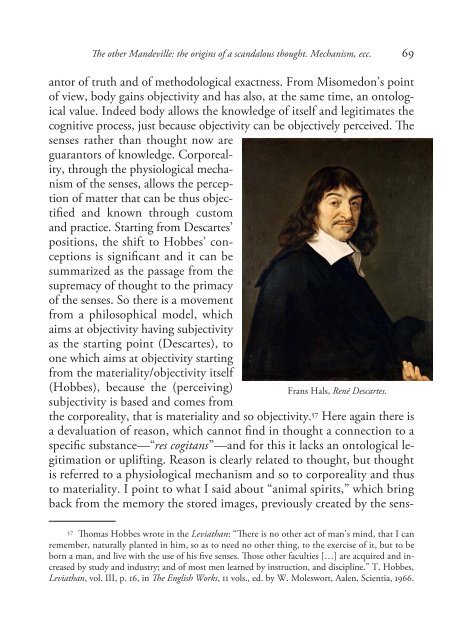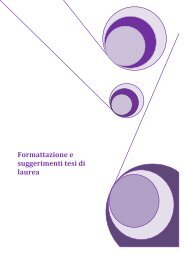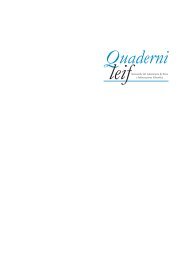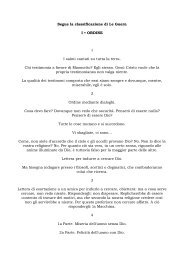qui - maria vita romeo
qui - maria vita romeo
qui - maria vita romeo
You also want an ePaper? Increase the reach of your titles
YUMPU automatically turns print PDFs into web optimized ePapers that Google loves.
e other Mandeville: the origins of a scandalous thought. Mechanism, ecc. 69<br />
antor of truth and of methodological exactness. From Misomedon’s point<br />
of view, body gains objectivity and has also, at the same time, an ontological<br />
value. Indeed body allows the knowledge of itself and legitimates the<br />
cognitive process, just because objectivity can be objectively perceived. e<br />
senses rather than thought now are<br />
guarantors of knowledge. Corporeality,<br />
through the physiological mechanism<br />
of the senses, allows the perception<br />
of matter that can be thus objectified<br />
and known through custom<br />
and practice. Starting from Descartes’<br />
positions, the shift to Hobbes’ conceptions<br />
is significant and it can be<br />
summarized as the passage from the<br />
supremacy of thought to the primacy<br />
of the senses. So there is a movement<br />
from a philosophical model, which<br />
aims at objectivity having subjectivity<br />
as the starting point (Descartes), to<br />
one which aims at objectivity starting<br />
from the materiali ty/objectivity itself<br />
(Hobbes), because the (perceiving)<br />
subjectivity is based and comes from<br />
Frans Hals, René Descartes.<br />
the corporeality, that is materiality and so objectivity. 57 Here again there is<br />
a devaluation of reason, which cannot find in thought a connection to a<br />
specific substance—“res cogitans”—and for this it lacks an ontological legitimation<br />
or uplifting. Reason is clearly related to thought, but thought<br />
is referred to a physiological mechanism and so to corporeality and thus<br />
to materiality. I point to what I said about “animal spirits,” which bring<br />
back from the memory the stored images, previously created by the sens-<br />
57 omas Hobbes wrote in the Leviathan: “ere is no other act of man’s mind, that I can<br />
remember, naturally planted in him, so as to need no other thing, to the exercise of it, but to be<br />
born a man, and live with the use of his five senses. ose other faculties […] are ac<strong>qui</strong>red and increased<br />
by study and industry; and of most men learned by instruction, and discipline.” T. Hobbes,<br />
Leviathan, vol. III, p. 16, in e English Works, 11 vols., ed. by W. Moleswort, Aalen, Scientia, 1966.








